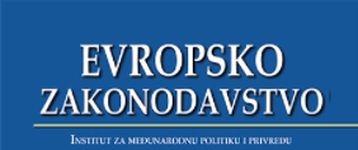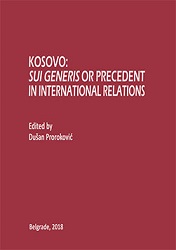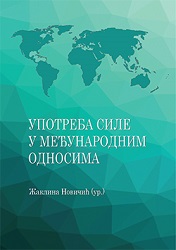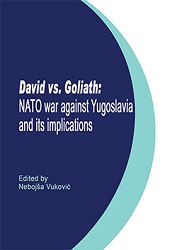


International Politics is a peer-reviewed, open-access scientific journal published by the Institute of International Politics and Economics, the leading scientific institution in the region dedicated to researching international relations. For more than 70 years, this interdisciplinary journal has published original analytical, theoretical, and review papers on a wide range of contemporary international political, economic, and legal relations. The journal is interested in the policies of the most important actors that shape modern international affairs. Topics dedicated to various territorial and ethnic conflicts and disputes, from interstate to intrastate, as well as their broader regional and global political, economic, and legal implications are also relevant. Other issues affecting contemporary international relations, such as global trade, economic and energy relations, international and regional integration, various forms of terrorism and fundamentalism, as well as the challenges posed by the migrant crisis, the global spread of contiguous diseases, and nuclear capacity in the world, are all significant to the journal. So, this scientific journal is based on an open and wide approach to the subject area.
International Politics does not charge any fees for submitting manuscripts or publishing articles. There are no hidden fees.
International Politics is an open-access journal, which means that all of the journal’s contents are available online for free. Users may read, download, copy, distribute, print, search, or link to content, as well as change, redesign, or rework it or use it in other legal ways, as long as they appropriately cite it.
International politics does not publish manuscripts that have the characteristics of plagiarism. Manuscripts found to contain plagiarism or auto-plagiarism will be rejected immediately. Plagiarism, i.e., the appropriation of other people’s ideas, words, or other forms of creative expression and their presentation as one’s own, is a serious violation of scientific and publishing ethics. Also, plagiarism may include copyright infringement, which is punishable by law.
All manuscripts are subject to a rigorous, double-blind review process by at least two reviewers who are experts in the field of the peer-reviewed article. The aim of the review is to provide authors with collegial feedback in order to improve their work and, critically, enable the editor to assess the suitability of the manuscript for publication.
Reviewers submit to the editor an assessment of the scientific value of the manuscript, evaluating the papers in relation to the compliance of the topic with the profile of the journal, the relevance of research areas and applied methods, originality, and scientific relevance of the manuscript. Reviewers treat manuscripts that they review as confidential documents. This applies both during and after the publishing process.
Authors are required to adhere to ethical standards relating to scientific research. The authors guarantee that the manuscript represents their original contribution, has not been previously published, and is not being considered for publication elsewhere. The authors additionally guarantee that the manuscript is free of false or unlawful claims and does not infringe on the rights of others. Also, the author’s obligation is to state in the manuscript whether there is a financial or other significant conflict of interest that could affect the research findings or their interpretation.
The journal is financially supported by the Ministry of Education, Science and Technological Development, Government of the Republic of Serbia. According to the law, all published issues and volumes of the journal are archived in the digital deposit of the National Library of Serbia. It is currently indexed in the following databases: Google Scholar and the Kobson database.
Authors are allowed to deposit the published version of the article in an institutional or thematic repository or to publish it on personal websites (including profiles on social networks such as ResearchGate, Academia.edu, etc.) or on the website of the institution where they are employed. Authors are required to provide a full bibliographic description of the article published in this journal (authors, title of the paper, title of the journal, volume, number, pagination) and put a link to the DOI tag of the article.
International Politics is published three times a year, in April, August, and December. The journal publishes Serbian-language articles, but it also accepts English-language manuscripts.
Editorial Policy >>>
Instructions to Authors>>>
Authors statement >>>
Editor-in-Chief:
Dr. Ana Jović-Lazić
Deputy Editor-in-Chief:
Dr. Sanja Jelisavac-Trošić
Secretary:
Milena Mitrović, MA
Contact:
mp@diplomacy.bg.ac.rs
EDITORIAL BOARD
Dr. Aleksandar JAZIĆ, Research Fellow, Institute of International Politics and Economics, Belgrade, Serbia
Dr. Aleksandar MILOŠEVIĆ, Assistant Professor, Faculty of Political Science, University of Belgrade, Belgrade, Serbia
Dr Aleksandra TOŠOVIĆ-STEVANOVIĆ, Research Fellow, Institute of International Politics and Economics, Belgrade, Serbia
Prof. Beatriz BISSIO, Associate Professor, Department of Political Science, Federal University of Rio de Janeiro, Rio de Janeiro, Brazil
Prof. Birgül DEMIRTAŞ, Full Professor, Turkish-German University, Department of Political Science and International Relations, Istanbul, Turkey
Dr. Bogdan STOJANOVIĆ, Research Fellow, Institute of International Politics and Economics, Belgrade, Serbia
Dr. Vladimir TRAPARA, Senior Research Fellow, Institute of International Politics and Economics, Belgrade, Serbia
Prof. Darina GRIGOROVA, Full Professor, Faculty of History, Sofia University “St. Kliment Ohridski, Sofia, Bulgaria
Dr. Dragan PETROVIĆ, Scientific Adviser, Institute of International Politics and Economics, Belgrade, Serbia
Dr. Dušan DOSTANIĆ, Research Fellow, Institute for Political Studies, Belgrade, Serbia
Dr. Žaklina NOVIČIĆ, Research Fellow, Institute of International Politics and Economics, Belgrade, Serbia
Prof. Zsuzsa M. CSÁSZÁR, Associate Professor, Department of Political Geography, Development and Regional Studies, University of Pécs, Pécs, Hungary
Dr. Ivan DUJIĆ, Research Fellow, Institute of International Politics and Economics, Belgrade, Serbia
Dr. Marko DAŠIĆ, Assistant Professor, Faculty of Political Science, University of Belgrade, Belgrade, Serbia
Dr. Marko KOVAČEVIĆ, Assistant, Faculty of Political Science, University of Belgrade, Belgrade, Serbia
Prof. Miloš HRNJAZ, Associate Professor, Faculty of Political Science, University of Belgrade, Belgrade, Serbia
Prof. Miroslav MLADENOVIĆ, Full Professor, Faculty of Security Studies, University of Belgrade, Belgrade, Serbia
Prof. Nemanja DŽUVEROVIĆ, Associate Professor, Faculty of Political Science, University of Belgrade, Belgrade, Serbia
Prof. Olga BARBASIEWICZ, Associate Professor, Faculty of International and Political Studies, Jagiellonian University, Kraków, Poland
Prof. Olga SHISHKINA, Associate Professor, Department of International Relations and Foreign Policy of Russia, MGIMO University, Moscow, Russia
Prof. Petar STANOJEVIĆ, Faculty of Security Studies, Associate Professor, University of Belgrade, Belgrade, Serbia
Prof. Rastislav KAZANSKÝ, Associate Professor, Faculty of Political Science and International Relations, Matej Bel University, Banskа Bystrica, Slovakia
Prof. Ruth FERRERO TURRIÓN, Associate Professor, Faculty of Political Science and Sociology, Complutense University of Madrid, Madrid, Spain
Prof. Sebastian STĘPIEŃ, Associate Professor, Faculty of Economics, Poznan University of Economics and Business, Poznan, Poland
Dr. Stevan GAJIĆ, Research Fellow, Institute for European Studies, Belgrade, Serbia
Dr. Stevan NEDELJKOVIĆ, Assistant Professor, Faculty of Political Science, University of Belgrade, Belgrade, Serbia
Dr. Halil Emre DENIŞ, Assistant Professor, Department of Political Science and International Relations, Hakkari University, Hakkari, Turkey
Dr Hrvoje BUTKOVIĆ, Senior Research Fellow, Institute for Development and International Relations, Zagreb, Croatia
EDITORIAL BOARD
Prof. Ivo VISKOVIĆ, Full Professor, Faculty of Political Science, University of Belgrade, Serbia
Prof. Alexis TROUDE, Full Professor, University of Versailles Saint-Quentin-en-Yvelines, Versailles, France
Dr Biser BANCHEV, Research Fellow, Institute for Balkan Studies, Bulgarian Academy of Sciences, Sofia, Bulgaria
Prof. Vasily KLAVDIEVICH BELOZEROV, Full Professor, Department of Political Science, Moscow State Linguistic University, Moscow, Russia
Prof. Violeta RAŠKOVIĆ-TALOVIĆ, Full Professor, Faculty of International Politics and Security Studies, University Union “Nikola Tesla”, Belgrade, Serbia
Dr. Dejan STOJKOVIĆ, Assistant Professor, University of Defense of the Republic of Serbia, Belgrade, Serbia
Dr. Zoltán HAJDÚ, Scientific Adviser, Hungarian Academy of Sciences, Centre for Economic and Regional Studies, ELKH Budapest
Prof. Jovanka ŠARANOVIĆ, Associate Professor, Institute for Strategic Research, Belgrade, Serbia
Prof. Luka BRKIĆ, Full Professor, Faculty of Political Science, University of Zagreb, Croatia
Prof. Marjan GJUROVSKI, Associate Professor, Faculty of Security Skopje, University “St. Kliment Ohridski”, Northern Macedonia
Dr. Miroslav GLIŠIĆ, Assistant Professor, University of Defense of the Republic of Serbia, Belgrade, Serbia
Prof. Tanja MIŠČEVIĆ, Full Professor, Faculty of Political Science, University of Belgrade, Belgrade, Serbia
Prof. Tian DEWEN, Full Professor, Institute of European Studies, Chinese Academy of Social Sciences, Beijing , China



Keywords: International Relations; Kosovo and Metohija; International Law; Kosovo
The Kosovo question has attracted the widespread attention of researchers, politicians, diplomats and analysts of international relations for more than three decades. as the Kosovo crisis developed in the direction of escalation or de-escalation, thus the issue of Kosovo and Metohija occupied a higher or a lower place on the “ranking list” of the priorities of the international community. nevertheless, it remained on that list permanently. during the observed period, the crisis reached its zenith twice. the first time, in the period 1998-1999, after the escalation of the war in Kosovo and the subsequent NATO aggression on the Federal republic of Yugoslavia. and the second time, in February 2008, when Kosovo Albanians unilaterally declared independence and their decision was soon recognized by dozens of states. on both occasions, numerous questions have been raised in the academic community. However, even today we are still searching for answers.
More...
Keywords: International Relations; Geopolitics
This thematic collection represents an attempt to systematically address some issues related to the use and exploitation of armed force, which is one of the central themes of international relations. The contemporary international context is constantly changing, and after the end of the Cold War there was a tendency to increasingly talk about the superiority of force in the era of globalization, that is, about the predominance of so-called non-military security threats. Unfortunately, practice shows that traditional armed force is a constant companion of international relations, which proves the justification, both social and scientific, for now, towards the end of the second decade of the 21st century, to re-examine some of the fundamental concepts and practices of international relations related to its use...
More...
Keywords: Geopolitics; Southeast Europe; Yugoslavia (SR); NATO aggression - 1999; NATO; Yugoslavia
The NATO aggression against the Federal Republic of Yugoslavia in 1999 is one of the most tragic episodes in the modern history of the Serbian people. In military terms, this conflict was almost absurd: the largest military coalition in history attacked a small and isolated country with a genuine threat to destroy it utterly. From the political and cultural point of view, this conflict brought to Serbia besides terrible destruction and numerous victims, a profound disappointment because the war was initiated by its former allies from the two great world wars. During the 20th century, in the First Balkan War and the First and Second World War, Serbia mainly fought against far superior enemies (the Ottoman Empire, the Austro-Hungarian Empire, Imperial Germany and later Nazi Germany) but always with a strong motive of freedom in the foreground. Serbia emerged as a winner and part of the winning alliances from all these conflicts. In so far, the military attack of the nineteen NATO member states on Serbia, i.e., the former FR Yugoslavia (the remaining federation of Serbia and Montenegro after the dissolution of the “Great Yugoslavia”), conducted by an alliance of some major allies from the previous wars (France, United Kingdom, USA), represented an enormous civilizational shock to the Serbian people. It was hard to comprehend and accept the ideological, political and “humanitarian” reasons declared by the Western allies as justification for their warfare. From this perspective, it can be stated that the fallen members of the Yugoslav Army and the Ministry of the Interior of Serbia demonstrated heroism and courage equal to those of their ancestors who fought in the previous wars for freedom and honor of the homeland. On the occasion of two decades of this, for many reasons, a unique war in military history, the Faculty of Security Studies of the University of Belgrade and the Institute of International Politics and Economics from Belgrade decided to publish the international thematic collection of scientific papers.
More...